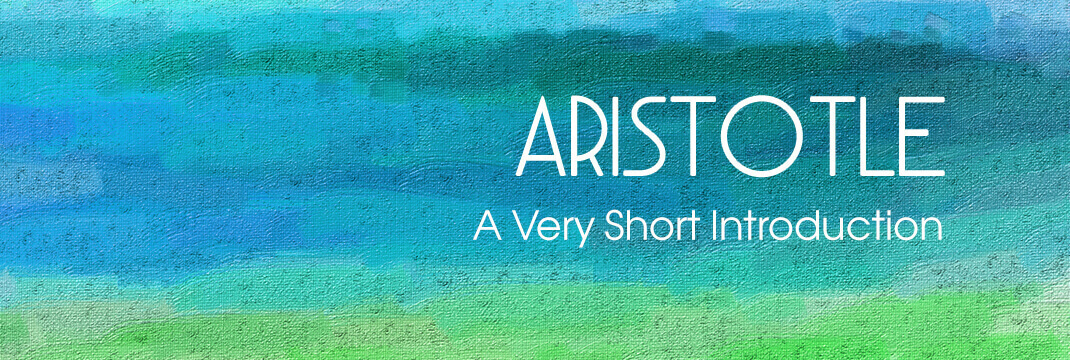
Introduction
Aristotle is a great philosopher, who made a number of outstanding discoveries in science, politics, and philosophy itself. According to Barnes, Aristotle was a scholar with wide and profound knowledge (Barnes). He was a teacher, who succeeded in inspiring the youth of Ancient Greece. Finally, he was an important political figure. Aristotle wrote a large number of works. However, only a fifth part of his writing survived. Among the most popular works, there are Metaphysics, Nicomachean Ethics, books on the Poets, Justice, Pleasure, Lectures on Political Theory, writings on ethics, political law, and others. As a result, the author pays increased attention to Aristotle’s studying.
Aristotle: A Very Short Introduction represents the utmost importance in the analysis of philosophy and natural science. For instance, the book represents an overview of the key principles of philosophy in the historical context. Barnes analyzes the scientific researches of Aristotle, his approaches to the logic and theories of metaphysics, ethics, politics, art, and poetry.
Main Ideas of Aristotle: A Very Short Introduction
The book consists of several chapters that address the issues of Aristotle’s life and works. For instance, there are chapters that describe Aristotle like a public figure, discuss zoological researches of the philosopher and his researches on philosophy. Other chapters address the issues of collecting facts by Aristotle, the attempts to develop the structure of science, describe the peculiarities of logic, knowledge, reality, psychology, teleology, practical philosophy, and change. The author also introduces the world picture of Aristotle.
The book provides an overview of Aristotle’s work in the sphere of natural science. Indeed, the historical researches made by Aristotle are impressive. However, they cannot be compared to the works on natural science. For instance, Aristotle studied a great number of sciences, such as astronomy, chemistry, biology, and meteorology. The results of the studies on biology are summarized in the History of Animals and the Dissections. The History of Animals discusses in detail the parts of animals, ways of reproduction among animals, and their behavior. Aristotle also describes a different animal, plant and insect species. For instance, every animal known in Ancient Greece was described by Aristotle. According to Barnes, Aristotle developed a new sphere of science, such as zoology (Barnes). However, there were several contradictions that the philosopher had to face. For instance, there had been a necessity to introduce the beginning of studying. He succeeded in developing the approach to zoology. According to Aristotle,
First, let us consider the parts of men… men are of necessity the sort of animal most familiar to us. Now the parts of men are clear enough to perception; nevertheless, in order that we may not break the proper sequence, and in order that we may rely on reason as well as perception, we must describe their parts – first the organic parts, then the uniform parts. (qtd. in Barnes)
As a result, Aristotle began the study of zoology with the description of men. It was determined by the fact that a man could represent a point of reference and it was supposed to be the most familiar. The majority of ideas determined by Aristotle were already known. However, he continued studying the subject. In addition, the scholar provided a full and orderly overview of the issue. Thus, Aristotle developed the logic sequence to study the surrounding environment. Barnes underlines that the philosopher’s research on human anatomy was correct (Barnes). At the same time, the conclusions, made by Aristotle, had not been discovered until the middle of the 19th century.
At the same time, the works of Aristotle are criticized for several errors. For instance, scholars point out that the philosopher did not properly describe the process of flies copulation. In addition, there are several errors in describing European bison. The scholars also underline that Aristotle did not succeed in applying the experimental method. In particular, the observations made by Aristotle were amateur. They were conducted in the field instead of the laboratory. Indeed, the scholar did not make an attempt to provide proper experimental conditions for pursuing controlled examinations. Finally, Aristotle omitted the importance of the measurements. According to Barnes, the descriptions provided by Aristotle are qualitative in nature, while real science is quantitative. As a result, Aristotle did not have a chance to measure analyzed species in a proper way. The scholar described the animals, insects, and plants driven by the impression of their looks, rather than the professional measurement of the specific peculiarities. Thus, Barnes succeeds in analyzing the drawbacks of Aristotle’s works.
The author also analyzes the process of scientific research applied by Aristotle. According to Barnes, Aristotle was a research scientist. As a result, he applied the approach based on first-hand studying. For instance, Aristotle observed every issue, reordered it, and made necessary conclusions. However, he also applied a number of methods. In particular, Aristotle’s works are based on the testimony of professionals in different spheres. The philosopher wrote sources at his disposal. In addition, Aristotle’s approaches were based on a comprehensive type of reading. Thus, Aristotle learned a lot of information from the books of his predecessors and made further research. According to Aristotle, rhetoric had a lot of previous works. While writing works on intellectual history, Aristotle used other scholars’ monographs, for example, Pythagoras or Democritus. However, Aristotle used the monographs in order to provide a start-point or further development, instead of summarizing the ideas of the works. At the same time, Aristotle did not always consult the past works. For instance, in the case of rhetoric, the majority of available materials were old and did not represent any value for further researches. At the same time, there were no works on logic (Barnes). Thus, the book underlines that the philosopher developed approaches to studying new subjects.
One of the most important research methods used by Aristotle is the reliance on tradition. Indeed, the philosopher was convinced that tradition represented an integral part of knowledge. According to Aristotle,
In all cases of discovery, when work is taken over from others who have earlier labored on the matter, gradual progress is later made by the hands of those who have taken it over, whereas what is discovered at the very beginning customarily makes but little advance at first. And yet this is far more useful than the later increase which depends upon it. (qtd. in Barnes)
The process of learning requires reliance on tradition and past discoveries. However, Aristotle expanded the concept of knowledge. For instance, the philosopher underlined that there was a necessity to adhere to reputable opinions rather than to prudent opinions (Barnes). Thus, Aristotle underlined the importance of reputable opinions. Reputable opinions are defined as something believed by the majority of people. In the work Topics, Aristotle gave the advice to collect reputable opinions and use them as a basis for future discoveries (Barnes). At the same time, reputable opinions can be endpoints as well. For instance, “if the difficulties are solved and the reputable opinions remain, sufficient proof of the matter will have been given” (Barnes).
However, besides being a political figure and researcher, Aristotle is well-known as a philosopher. In particular, he had a good education. In 367, Aristotle entered Plato’s school (Barnes). The school was the primary philosophy academy. However, there were other subjects, such as mathematics, rhetoric, and logic. According to Barnes, Plato made an impact on the development of Aristotle’s points of view. In particular, Aristotle loved and respected Plato, but he rejected his beliefs. Barnes points out five points that influenced Aristotle’s philosophical thought. First, Plato did not support the unity of science. According to Plato, science had a well-organized and determined structure. Secondly, Plato is known as the representative of dialectics. At the same time, Aristotle is a pioneer in the development of logic. Thus, both Aristotle and Plato were founders of logic. Moreover, Plato provided the basis for Aristotle’s future discoveries. Similarly to logic, Plato was familiar with the theory of ontology. Ontology determines the fundamental constituents of the world. The approach to the ontology introduced by Plato was based on the Ideas or Forms. According to the theory of Ideas and Forms, the ultimate realities are determined as the abstract universals. However, Aristotle did not accept the theory of Plato and developed his own approaches to ontology. Fourthly, Plato defined scientific knowledge as a way to discover the things around. Thus, there is a relationship between knowledge and explanation. Aristotle inherited Plato’s reliance on tradition. Aristotle was convinced that tradition represented an integral part of knowledge. At the same time, the philosopher provides an overview of the connection between knowledge and explanation. However, Aristotle expanded the approaches to the explanation. In particular, besides observing and recoding, Aristotle underlined the importance of explaining. Finally, knowledge acquisition is inevitably connected with the necessity of answering a number of questions. The branch of science that addresses the philosophy questions is known as epistemology. Epistemology was discussed by Plato and developed by Aristotle.
Another important idea of the book is the necessity of science structure development. In Ancient Greece, the most developed science was geometry. For instance, Euclid introduced the deductive system of geometry that has its distinguishing principles, theorems, and axioms. Plato expanded this rule to other spheres of human life. In addition, every scientific truth was supposed to have a logical structure. Aristotle shared the same approach. However, he claimed that knowledge could not be based upon a single set of principles. According to Aristotle, ‘the causes and principles of various things are different – in one way; but in another way, if you speak universally and by analogy, they are all the same’ (Barnes). Thus, all aspects of science have the same formal structure. In addition, Aristotle introduced three major classes of knowledge. For instance, there are practical, productive, or theoretical classes. Productive science is dealing with the sciences that make things, such as poetics or rhetoric. Practical sciences are related to actions and behavior in particular situations. Ethics and politics are the sciences that belong to the practical class. If the science does not belong to either production or action, in private or in public affairs, it is determined as theoretical classes. Theoretical sciences include mathematics, natural science, and theology.
According to Aristotle, science belongs to the theoretical class if the aim of knowledge is the truth, but not production or action. The author underlines that theoretical knowledge represents the way people think of science. As Aristotle underlined, it is “contained by far the greatest part of the sum of human knowledge” (Barnes). In addition, the theoretical class of science can be subdivided into three groups: ‘there are three theoretical philosophies – mathematics, natural science, and theology’ (Barnes). Aristotle wrote a huge number of works on mathematics, Metaphysics being one of them. Botany, zoology, psychology, chemistry, physics, and meteorology are natural sciences. According to Aristotle, the nature of natural sciences can be characterized by two key principles. First, natural sciences can experience change or motion. That is the main difference between natural sciences and mathematics. Secondly, natural sciences exist as a separate group of the sciences. Despite the fact, that the greatest part of Aristotle studying is devoted to the analysis of natural sciences, the scholar did agree that natural science was not the best of sciences. Aristotle pointed out ‘If there are no substances apart from natural substances, natural science will be the primary science; but if there are changeless substances, the science of them will be prior and will be the primary philosophy’ (Barnes). Indeed, Aristotle supported Plato that there are different substances that do not experience changes. Such substances are called divine. A study that deals with divine substances are called theology. Barnes underlines that theology is superior to the rest of the sciences. According to Aristotle, “the theoretical sciences are preferable to the rest and this to the other theoretical sciences” (Barnes). However, theology not only defines the parts of the havens, but it studies astronomy as well.
At the same time, Aristotle tried to distinguish the place of every science in the general picture of knowledge (see fig. 1). It was determined by the fact that two sciences were not included in the division introduced by Aristotle. These sciences are metaphysics and logic.

Figure 1. The structure of human knowledge introduced by Aristotle (Barnes, 2001).
Aristotle: A Very Short Introduction also discusses other ideas, such as the issues of collecting facts by Aristotle, and describes the peculiarities of logic, knowledge, reality, psychology, teleology, practical philosophy, and change. In order to provide a better understanding of the development of Aristotle’s philosophical approaches and analyze them, the author also introduces the world picture of Aristotle.
Conclusion
Thus, the book has the utmost importance in the analysis of the philosophy. In particular, Aristotle’s A Very Short Introduction analyses the key principles of philosophy in the historical context. Barnes provides an overview of Aristotle’s scientific researches, his analysis of the logic and theories of metaphysics, ethics, politics, art, and poetry. Another idea of the book is that Aristotle has influenced the history of Western philosophy.
Thus, the book is well-organized. It provides an accessible way for analysis of Aristotle’s works. There are also a number of illustrations that demonstrate the places visited by Aristotle, or places where the philosopher lived, as well as examples of his work. The book also provides a map of Greece that demonstrates the places where Aristotle worked. Besides analyzing Aristotle’s works, the book starts with an introduction to the philosopher’s biography. As a result, the reader can trace the influence of character and personality on the development of the philosopher’s approaches.
The genres discussed in the book are represented by philosophy and knowledge. The book reviews the key principles and tendencies of science development. The work is written as an analysis of Aristotle’s works and their impact on science in general. The author uses a formal style that suits the intended audience. At the same time, Barnes clearly defines concepts used in the book, such as approaches to science and classes of sciences. At the same time, some areas remain uncovered. In particular, the studying of Aristotle’s heritage as a politician or teacher is not examined properly. However, the book is historically accurate.



